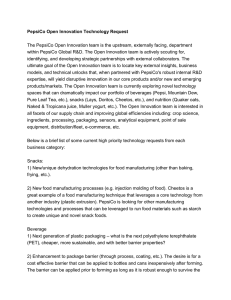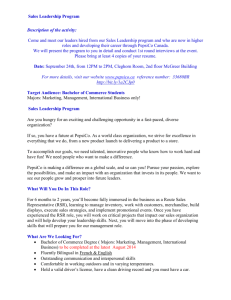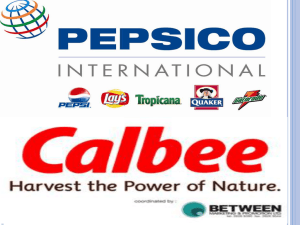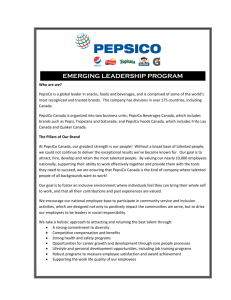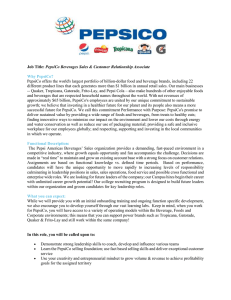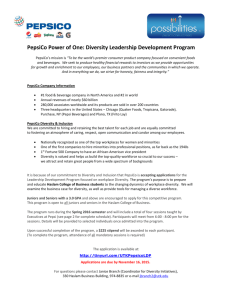PepsiCo Open Innovation Technology Request
advertisement
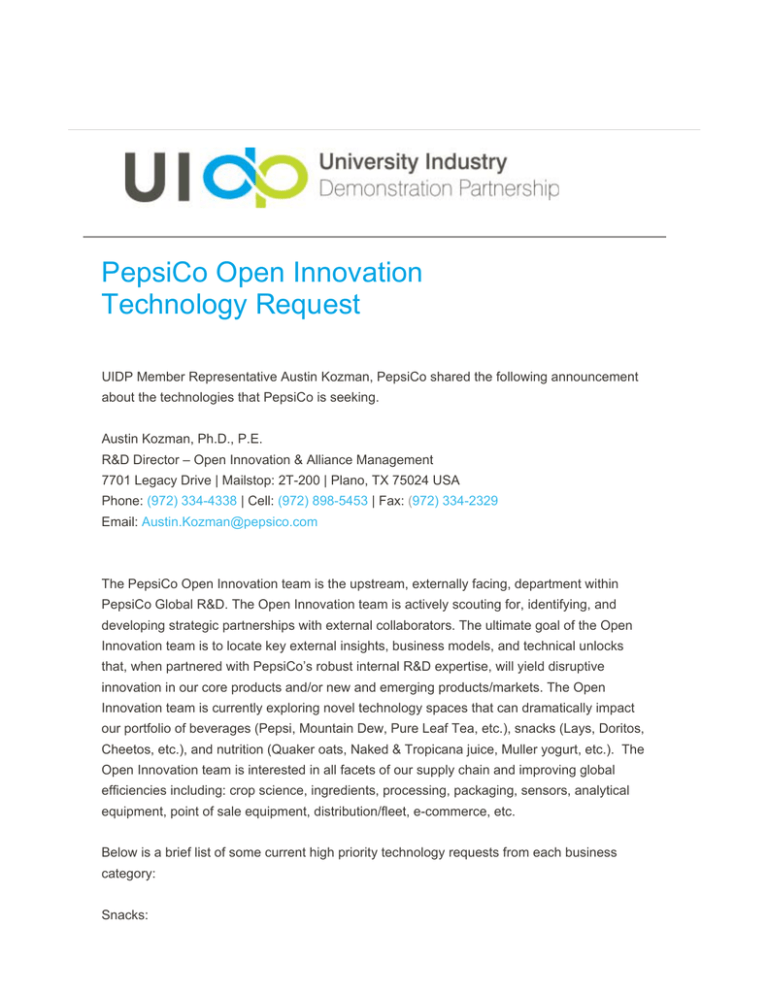
PepsiCo Open Innovation Technology Request UIDP Member Representative Austin Kozman, PepsiCo shared the following announcement about the technologies that PepsiCo is seeking. Austin Kozman, Ph.D., P.E. R&D Director – Open Innovation & Alliance Management 7701 Legacy Drive | Mailstop: 2T-200 | Plano, TX 75024 USA Phone: (972) 334-4338 | Cell: (972) 898-5453 | Fax: (972) 334-2329 Email: Austin.Kozman@pepsico.com The PepsiCo Open Innovation team is the upstream, externally facing, department within PepsiCo Global R&D. The Open Innovation team is actively scouting for, identifying, and developing strategic partnerships with external collaborators. The ultimate goal of the Open Innovation team is to locate key external insights, business models, and technical unlocks that, when partnered with PepsiCo’s robust internal R&D expertise, will yield disruptive innovation in our core products and/or new and emerging products/markets. The Open Innovation team is currently exploring novel technology spaces that can dramatically impact our portfolio of beverages (Pepsi, Mountain Dew, Pure Leaf Tea, etc.), snacks (Lays, Doritos, Cheetos, etc.), and nutrition (Quaker oats, Naked & Tropicana juice, Muller yogurt, etc.). The Open Innovation team is interested in all facets of our supply chain and improving global efficiencies including: crop science, ingredients, processing, packaging, sensors, analytical equipment, point of sale equipment, distribution/fleet, e-commerce, etc. Below is a brief list of some current high priority technology requests from each business category: Snacks: 1) New/unique dehydration technologies for food manufacturing (other than baking, frying, etc.). Dehydration is critical to the PepsiCo’s Snack portfolio. The dehydration method has a large impact on the final taste, texture, and appearance of the finished snack. PepsiCo is interested in new methods to dehydrate food that produce novel and differentiated finished products. The alternative dehydration method could be leveraged from a non-food industry source. 2) New food manufacturing processes (e.g. injection molding of food). Cheetos is a great example of a food manufacturing technique that leverages a core technology from another industry (plastic extrusion). PepsiCo is looking for other manufacturing technologies and processes that can be leveraged to run food materials such as starch to create unique and novel snack foods. Beverage: 1) Next generation of plastic packaging – what is the next polyethylene terephthalate (PET), cheaper, more sustainable, and with better barrier properties? The desire is to reduce the amount of plastic material used per bottle, but still achieve at least the same performance without adversely impacting the recycle stream. Materials will have desirable mechanical properties, crystallinity, strength, and polymer orientation, all while achieving a lower overall bottle weight. Some materials may have additional desirable properties such as maintaining carbonation levels, or stability to beverages with low pH values. 2) Enhancement to package barrier (through process, coating, etc.). The desire is for a cost effective barrier that can be applied to bottles and cans inexpensively after forming. The barrier can be applied prior to forming as long as it is robust enough to survive the forming process and still be uniform in thickness with no imperfections. Solutions that provide for enhanced barrier through process changes are also of interest. Nutrition: 1) Nontraditional binders for granola bars that would improve nutritional and ingredient statement advantage (e.g. reduced sugar). The goal is also to reduce the amount of binder required to agglomerate the food particles. Binders with no sweetness are desired because they have diverse applications into savory snack clusters and bars. 2) Advances in sterilization/pasteurization technologies including alternative processes for finished package/bottle. The technology scouting includes sterilization tolerant probiotics and aseptic filling with particulates (fruit, grains, probiotics, etc.). The ultimate goal is technologies that can produce sterilization kill rates equivalent to conventional thermal sterilization, but at room temperatures. Technologies capable of reduced time and/or temperature sterilization are also of interest. As PepsiCo’s food and beverage portfolio grows, technologies that can handle multi-phase products (liquid and solids) are becoming more critical. University Engagement with DTRA Webinar October 28, 1-2pm ET 1:00-1:10 PM: DTRA Leadership will provide a brief overview of DTRA's mission and R&D focus 1:10-1:45 PM: "Doing Business with DTRA" Suggestions and Lessons Learned: An in depth look at different kinds of business opportunities and how to find them. Presenters: Ms. Elizabeth Braxton, DTRA Contracting Supervisory Specialist Mr. Mark DeGroodt, DTRA Technical Program Manager 1211 Connecticut Ave. NW Suite 650 Washington, DC 20036 Phone: (202) 640-6592
